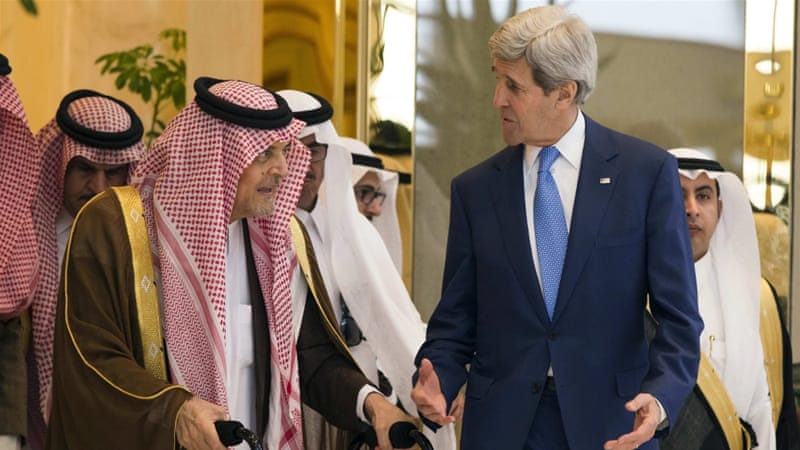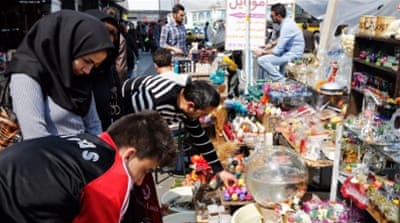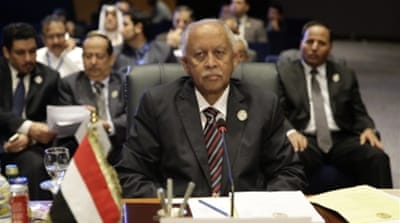Iran, the United States and five other world powers have sealed a
breakthrough framework agreement
outlining limits on Iran's nuclear programme, despite attempts by
Israel and Saudi Arabia to thwart the deal. Al Jazeera spoke with four
analysts about why Saudi Arabia and other Gulf countries, along with
Israel, are upset about the agreement.
| Mansour al-Bogami, Saudi researcher |
A nuclear deal with Tehran, from the Saudi perspective,
means two things: Iran will have the ability to improve its economic
standing, and the capability to create a nuclear weapon - since the deal
will only take effect for a relatively short period of time, 15 years,
and will not destroy Iran's technical capabilities to maintain a nuclear
programme. Both results would strengthen Iran and its allies in the
region.
The Saudis believe that trimming Iran's regional influence would increase the chances of a better nuclear deal in the future.
|
This context of an increasing Iranian influence that thrives on weak
central governments and sectarian instability - as seen in Lebanon, Iraq
and Yemen - is what ISIL capitalises on in its recruitment drive,
according to the Saudi view.
The immediate Saudi reaction to the deal will likely include attempts to revive
the dual structure of the regional order: Saudi versus Iran, which
existed until the Arab uprisings in 2011 led to the formation of a third
camp comprised of Turkey, Qatar and the Muslim Brotherhood. This
camp and Saudi Arabia both exhausted their resources while competing
for regional influence, ultimately benefiting Iran.
An indicator of the return to the old regional order is the
Saudi-led coalition against the Houthi rebels in Yemen. This military
campaign has two goals: neutralising non-state actors, which means
strengthening the central government, and combating sectarian-inspired
conflicts and regional instability.
Saudi's new rulers wish to transform the political equation
from a balance between the state and non-state actors into a balance
between a government and an opposition, both from within the state's
framework. In such a situation, both Iran and ISIL would become much
less effective.The Saudis believe that trimming Iran's regional
influence would increase the chances of a better nuclear deal in the
future, as there may always be modifications and alterations to the deal
signed this week.
In the medium as well as the long run, Saudi officials have said
their country would work to acquire deterrent capabilities, which means
developing its own nuclear programme. There is a strong chance that
Saudi Arabia will seek new alliances, given the decline of US influence
and the unreliability of American assurances - and Saudi Arabia, instead
of the Americans, would become the first line of defence against its
enemies.
Indeed, Saudi is undertaking a process of realigning
the geopolitical map of the Middle East - but the time that this
process will take remains to be seen.
| Nasser Ahmed Bin Ghaith, United Arab Emirates researcher |
There are mixed reactions in the Gulf towards the
Iranian nuclear deal. Those who support a deal - any deal - argue it
would prevent the region from sliding into a destructive nuclear arms
race that would deplete everybody. But others say the deal will have a number of negative consequences for the Gulf.
The secretive nature of the talks made many uncomfortable
about the outcome, as did the absence of Gulf Cooperation Council (GCC)
members. Wisdom has it that if you do not have enough cards on the
negotiating table, you may not get everything you want, but if you are
not even present, you will certainly get nothing.
A compromise between negotiating parties would stipulate mutual
concessions, and the question remains: Beyond the lifting of economic
sanctions, what would Iran want in return for ending its nuclear
programme?
|
In Geneva, everybody concerned was present except for the
Gulf states, which would be directly impacted by any kind of agreement
in their backyard.
Additionally, any deal between Iran and the US would
likely not be favourable to the GCC states. A compromise between
negotiating parties would stipulate mutual concessions, and the question
remains: Beyond the lifting of economic sanctions, what would Iran want
in return for ending its nuclear programme?
The US surely does not want to see a more powerful
Iranian hegemony in the region, but at the same time, it does not appear
to mind some kind of Iranian influence in the region. Iran has been
seeking to reclaim its previous role as the region's police.
It is clear that a western recognition of Iranian
regional influence would come at the expense of the Gulf states, given
that they are the weakest link in the regional chain of influence. In
the post-deal reality, there would be three regional powers: Iran,
Turkey and Israel.
From an economic perspective, any agreement between Iran and the West
would certainly lead to the lifting of sanctions on Iranian oil exports
that are estimated at between one and 1.5 million barrels a day.
This would further flood the already saturated oil market with cheap
Iranian oil, bringing prices even further down. If this persisted, it
would have adverse economic consequences on the Gulf states, which are
already financially overstretched.
In light of these shifting realities, the Gulf Arab states may be
wise to make a number of changes to preserve their long-term interests,
including to abandon their military and security alliance with US in
favour of their own joint military cooperation.
The Gulf states should also build strategic partnerships with the
regional powers of Pakistan and Turkey, who share the Gulf nations'
fears of Iranian ambitions in the region. Finally, the Gulf states would
need to improve internal GCC relations; indeed, their cooperation in
the Yemen air campaign has shown that these states can not only work
together on regional threats and initiate major actions, but also have
the potential to become a major regional player capable of countering
US-backed Iranian hegemony.
| Seif Da'na, sociology professor at the University of Wisconsin-Parkside |
Only in the miniature Israeli world of the Game of
Thrones - a world of imagination - might Iran, whose GDP is about two
percent of that of the US, possibly constitute a threat to the most
powerful empire in history.
In the real world, such a threat would not exist even if Israeli
Prime Minister Benjamin Netanyahu inflated the numbers of Iran's
centrifuges 32 times, contradicted and ignored his own government's
intelligence assessments, and used the hitherto common imperial tactic
of psychopathologising Iran and Arab resistance leaders.
On March 29, Israel's Ynetnews reported that "Iran has tentatively
agreed to limit centrifuges used to enrich uranium to 6,000 - or even
less". Thus, applauding Netanyahu's magical 190,000 number in the US
Congress must seem foolish today. Al Jazeera's publication of leaked
"Spy Cables" also revealed that Israel's Mossad contradicted Netanyahu
on Iran's nuclear programme.
Even dismantling Iran's civilian programme entirely does not satisfy
Netanyahu's appetite; it is the Iranian 'policies', 'behaviour' and
'state' that he wants eliminated.
|
An Iranian nuclear bomb - one that belongs to the world of
imagination, according to most experts - does not even constitute a
threat to Israel, let alone the US. A newly released US document from a
1987 assessment of Israel's nuclear weapons capabilities by the US
Pentagon stated that Israel was experimenting with coding, "which will
enable them to make hydrogen bombs", described as "a thousand times more
powerful than atom bombs".
That was the US assessment of Israel's programme 28 years
ago. It is not surprising, then, that US President Barack Obama is not
fooled by Netanyahu's absurd account.
A careful reading of Netanyahu's speech reveals that it is
Iran's competitive regional status and rising power that concerns him
the most, not the fantasy of an existential threat. It is the regional
balance of power, not the bomb. Even dismantling Iran's civilian
programme entirely does not satisfy Netanyahu's appetite; it is the
Iranian "policies", "behaviour" and "state" that he wants eliminated.
According to experts with Israel's Institute for National
Security Studies, the nuclear deal is dangerous because it could "widen
the existing disputes between the Israeli government and the US
administration". Israeli strategic experts argued in the most recent
Hertzliya's Conference that the US is "the most important political and
security asset that Israel has in the international sphere".
Neither Iran nor the US is interested in military
confrontation and both have much to gain from an agreement. But since
this deal will constitute a building block towards diplomatically
resolving other regional conflicts involving Iran and the US, all sides
have been negotiating with their eyes on the future.
For all forces involved, winning and losing are not etched
in stone. Saudi Arabia and Israel can be either losers or winners. If
they really do not want a bomb, they are winners. If they want Iran to
stop being Iran - if they seek nothing less than Iran's destruction -
they will definitely lose.
| Jonathan Cook, journalist |
The fear in Israel is that Iran's development of any
nuclear technology will move it closer to becoming a nuclear threshold
state, capable of developing a bomb at short notice should its interests
be threatened.
Netanyahu has spoken endlessly of a supposed genocidal
intent from Iran's Shia leaders, invoking imagery of an impending second
Holocaust of the Jewish people. But the real problem for Israel is that
a nuclear Iran endangers its decades-old strategy of establishing
itself as an unrivalled military power in the Middle East. That status
depends on Israel being able to threaten large states like Iran into
submission, contain them militarily and prevent them from spreading
their influence beyond their own borders.
Israel's monopoly on nuclear arms in the region - with an
arsenal of as many as 200 warheads, entirely unmonitored by the
international community - has secured its position as the region's
hegemon. But all of that was placed in jeopardy by the Iran talks.
With a nuclear-armed Iran, Israel would also be severely limited in
its ability to strike against Tehran's regional allies, including the
Lebanese Hezbollah, possibly the single most formidable foe Israel
faces.
|
Iran's leaders only need to look to neighbouring Iraq to
draw conclusions about how important a nuclear deterrent is. Israel
destroyed Baghdad's Osirak nuclear reactor in 1981, and the US invaded
and occupied Iraq in 2003.
A nuclear-armed Iran - or even one that was days or weeks
from developing a bomb, with the facilities hidden deep underground -
would be off-limits to any such serious military attack.
With a nuclear-armed Iran, Israel would also be
severely limited in its ability to strike against Tehran's regional
allies, including the Lebanese Hezbollah, possibly the single most
formidable foe Israel faces.
Israel has been regularly targeting attempts by Iran
and the crumbling Syrian regime of Bashar al-Assad to transfer weapons
to Hezbollah and to fortify their joint positions, including next to the
Golan, against Sunni Islamist groups trying to overthrow Assad.
Effectively, Israel has been playing off the forces vying for power in Syria to keep them all exhausted by the fighting. Israeli
air strikes in Syria
designed to weaken Iranian influence - such as the one in January that
killed a dozen senior Hezbollah and Iranian commanders - would be
unthinkable if Tehran had a bomb.
Israel would have to resign itself to the fact that
having powerful military forces just across the border, united under the
umbrella of an Iranian bomb, would be a match for Israel's own army. As
a result, Israel would face its own Cold War in the Middle East, with
the ultimate threat of mutually assured destruction should either side
try to push unilateral measures too far.
But Israel's fears extend further. Until now, Israel
has faced no serious competition over its strategic alliance with
Washington, and especially the Pentagon. The special relationship is
rooted in Israel's nuclear arsenal and the military might it wields in
the Middle East as a consequence.
Israel's nuclear weapons, developed in the late 1960s
over the White House's opposition, burrowed into the heart of the US
security establishment. Israel exchanged its so-called "Sampson Option" -
the threat of inflicting nuclear annihilation - for access to US
intelligence, aid and arms programmes that provide it with an
unchallengeable military edge.
But were Iran also to become a nuclear state, that
special relationship might quickly erode. Washington policymakers would
have to take into account not just Israel's strategic concerns, but
Iran's too. In fact, given Iran's control over access to much of
the Gulf's oil, an Iranian nuclear weapon might cement Tehran's position
as Washington's most privileged partner in the region.
Rival military power centres in the Middle East would
transform the White House and Pentagon's assessment of US strategic
interests in the region. The consequences would likely be felt
most acutely by Israel in its conflict with the Palestinians. While Iran
would be able to intensify its support for Palestinian resistance
groups such as Hamas or Islamic Jihad, Israel would have limited options
for a response.
With the constant danger that tensions between Israel
on the one side and Lebanese and Palestinian resistance movements on
the other might escalate into a nuclear standoff with Iran, the US would
have a much greater incentive to force Israel to solve its conflict
with the Palestinians, something it resolutely opposed till now.
Source: Al Jazeera





![Tunisia anti-terror march kicks off World Social Forum Demonstrators chanted 'Tunisia is free, terrorism out,' as they condemned the Bardo attack [Rabii Kalboussi/Al Jazeera]](http://www.aljazeera.com/mritems/imagecache/mbdxxlarge/mritems/Images/2015/3/24/92faf3a91e97471c87949e01f571e4ed_18.jpg)


